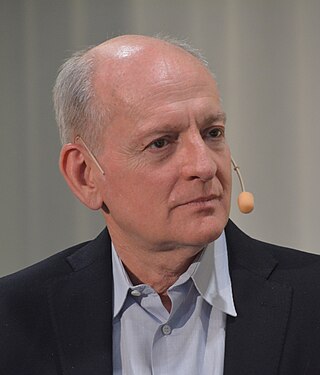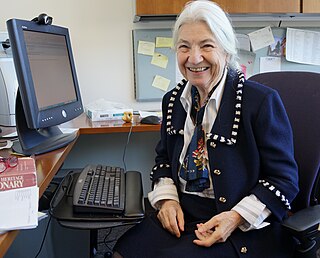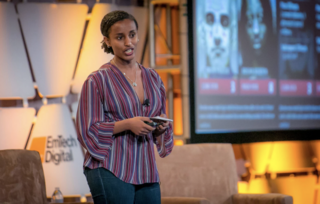Related Research Articles

Stuart Jonathan Russell is a British computer scientist known for his contributions to artificial intelligence (AI). He is a professor of computer science at the University of California, Berkeley and was from 2008 to 2011 an adjunct professor of neurological surgery at the University of California, San Francisco. He holds the Smith-Zadeh Chair in Engineering at University of California, Berkeley. He founded and leads the Center for Human-Compatible Artificial Intelligence (CHAI) at UC Berkeley. Russell is the co-author with Peter Norvig of the authoritative textbook of the field of AI: Artificial Intelligence: A Modern Approach used in more than 1,500 universities in 135 countries.
Randy Howard Katz is a distinguished professor emeritus at University of California, Berkeley of the electrical engineering and computer science department.
David Ethan Culler is a computer scientist and former chair of the Department of Electrical Engineering and Computer Sciences at the University of California, Berkeley. He is a principal investigator in the Software Defined Buildings (SDB) project at the EECS Department at Berkeley and the faculty director of the i4Energy Center. His research addresses networks of small, embedded wireless devices, planetary-scale internet services, parallel computer architecture, parallel programming languages, and high performance communication. This includes TinyOS, Berkeley Motes, PlanetLab, Networks of Workstations (NOW), Internet services, Active Message, Split-C, and the Threaded Abstract Machine (TAM).

John F. Canny is an Australian computer scientist, and Paul E Jacobs and Stacy Jacobs Distinguished Professor of Engineering in the Computer Science Department of the University of California, Berkeley. He has made significant contributions in various areas of computer science and mathematics, including artificial intelligence, robotics, computer graphics, human-computer interaction, computer security, computational algebra, and computational geometry.

Ruzena Bajcsy is an American engineer and computer scientist who specializes in robotics. She is professor of electrical engineering and computer science at the University of California, Berkeley, where she is also director emerita of CITRIS.

Chrome Web Store is Google's online store for its Chrome web browser. As of 2022, Chrome Web Store hosts about 123,000 extensions and 29,000 themes.

Constance J. Chang-Hasnain is chairperson and founder of Berxel Photonics Co. Ltd. and Whinnery Professor Emerita of the University of California, Berkeley. She was President of Optica in 2021.

Jitendra Malik is an Indian-American academic who is the Arthur J. Chick Professor of Electrical Engineering and Computer Sciences at the University of California, Berkeley. He is known for his research in computer vision.
Dawn Song is a Chinese American academic and is a professor at the University of California, Berkeley, in the Electrical Engineering and Computer Science Department.
Browser security is the application of Internet security to web browsers in order to protect networked data and computer systems from breaches of privacy or malware. Security exploits of browsers often use JavaScript, sometimes with cross-site scripting (XSS) with a secondary payload using Adobe Flash. Security exploits can also take advantage of vulnerabilities that are commonly exploited in all browsers.

Google Docs is an online word processor included as part of the free, web-based Google Docs Editors suite offered by Google, which also includes Google Sheets, Google Slides, Google Drawings, Google Forms, Google Sites and Google Keep. Google Docs is accessible via an internet browser as a web-based application and is also available as a mobile app on Android and iOS and as a desktop application on Google's ChromeOS.

Valerie Elaine Taylor is an American computer scientist who is the director of the Mathematics and Computer Science Division of Argonne National Laboratory in Illinois. Her research includes topics such as performance analysis, power analysis, and resiliency. She is known for her work on "Prophesy," described as "a database used to collect and analyze data to predict the performance on different applications on parallel systems."
Sylvia Ratnasamy is a Belgian-Indian computer scientist. She is best known as one of the inventors of the distributed hash table (DHT). Her doctoral dissertation proposed the content-addressable networks, one of the original DHTs, and she received the ACM Grace Murray Hopper Award in 2014 for this work. She is currently a professor at the University of California, Berkeley.
Robert Wilensky was an American computer scientist and emeritus professor at the UC Berkeley School of Information, with his main focus of research in artificial intelligence.
Sushil Jajodia is a computer scientist known for his work on cyber security and privacy, databases, and distributed systems.
Trevor Jackson Darrell is an American computer scientist and professor at the University of California, Berkeley. He is known for his research on computer vision and machine learning and is one of the leading experts on topics such as deep learning and explainable AI.

Rediet Abebe is an Ethiopian computer scientist working in algorithms and artificial intelligence. She is an assistant professor of computer science at the University of California, Berkeley. Previously, she was a Junior Fellow at the Harvard Society of Fellows.
Jessica Hullman is a computer scientist and the Ginni Rometty associate professor of Computer Science at Northwestern University. She is known for her research in Information visualization.
Paula Birdwell Hawthorn is an American computer scientist. She is recognised as an expert and pioneer in database systems. She has also founded organisations for women in computer science and created affirmative action programs to support students in the field.

Chelsea Finn is an American computer scientist and assistant professor at Stanford University. Her research investigates intelligence through the interactions of robots, with the hope to create robotic systems that can learn how to learn. She is part of the Google Brain group.
References
- ↑ "Towards Comprehensible and Effective Permission Systems | EECS at UC Berkeley". www2.eecs.berkeley.edu. Retrieved 2022-12-31.
- ↑ "ACM CCS 2022". www.sigsac.org. Retrieved 2022-12-31.
- ↑ "Google Set to Change Malware, Phishing Warnings Following Study". threatpost.com. Retrieved 2022-12-31.
- ↑ Greenberg, Andy. "Google's Chrome Hackers Are About to Upend Your Idea of Web Security". Wired. ISSN 1059-1028 . Retrieved 2022-12-31.
- ↑ Aue, Mary von. "Google Enables Quick Emoji Use in Chrome — Here's How". Inverse. Retrieved 2022-12-31.
- ↑ "Edward Porter Felt - Flight 93 National Memorial (U.S. National Park Service)". www.nps.gov. Retrieved 2022-12-31.
- ↑ "__apf__". Twitter. Retrieved 2022-12-31.